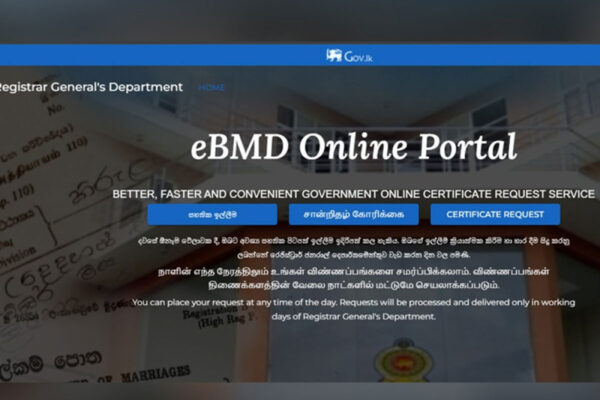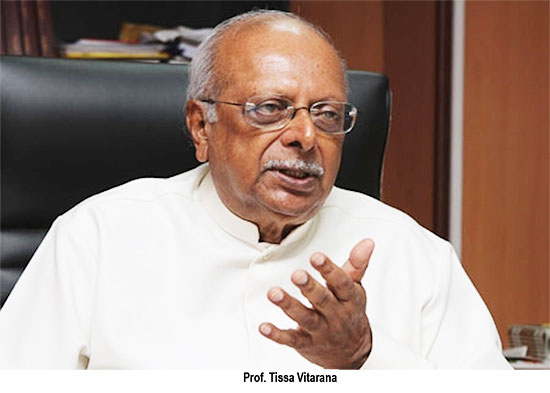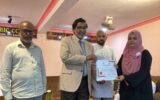COLOMBO: Video Message from Ali Sabry minister of foreign affairs at the Jamiah Naleemiah convocation and golden jubilee celebrations at the BMICH on Saturday June 24 in Colombo .
“I am delighted to deliver this message on the occasion of the Golden Jubilee celebration of the Naleemiah Institute of Islamic Studies. Regrettably, I am unable to attend today as my commitment to national duty has taken me outside the borders of our cherished homeland.
Many words have been written about education’s transformative power. Few words encapsulate the philosophy more than Malcom X’s quote: “Education is the passport to the future, for tomorrow belongs to those who prepare for it today.”
A historical comparison of schooling within the Muslim population in Sri Lanka reveals some striking discrepancies. There were only two Muslim teachers in the entire country in 1875. There were no Muslim students on the list of examiners or scholarship recipients in 1878. In 1879, the entire country had only 1233 Muslim pupils, accounting for approximately 2.2% of the overall population. In 1880, there was only one Muslim student at Royal College, then known as the Colombo Academy. Today, we observe that the proportion of Muslim students entering our universities is on par with the rest, with the exception of engineering and related fields.
According to Surah Ar-Ra’d (13:11), “Indeed, Allah will not change the condition of a people until they change what is in themselves.” We were brought here by our forefathers and past leaders were instrumental in converting what was once a community devoid of formal education into one that has produced world-class intellects. When we discuss this transition, three people spring to mind. They are Siddi Lebbe Marrikkar, Dr. T B Jayah, and Dr. Badi Ud Din Mahmud.
Siddi Lebbe Marikkar was a visionary leader who challenged traditional Muslim educational practises. He advocated for a well-rounded, secular education with Islamic values. He also recognised the significance of being fluent in English. Siddi Lebbe and his contemporaries were instrumental in changing people’s perceptions and attitudes towards education. In order to attain this goal, he co-founded Madrasul Zahira, which had a significant impact on Muslim attitudes towards education.
T.B. Jayah, among other accomplishments, trans formed Zahira College from a modest school into one of the major educational institutions in Sri Lanka. He accomplished this through a variety of initiatives and strategies. However, he did not stop there; he established branches of Zahira College throughout Sri Lanka, including Kalmunai, Mawanella, Matale, Gampola, and Aluthgama. He also founded the community’s first Muslim girls’ school and was instrumental in the establishment of Muslim teacher training colleges.
Dr. Badi Ud Din Mahmud saw a crucial issue to the further advancement of education of the Muslims – that the women were not coming to school. This was a result of tradition and conservative values prevalent at the time towards the education of women and also to being in a mixed setting. In 1956, he founded Badi-ud-din Mahmud Girls’ College in Kandy. The school was founded with the aim of providing quality education to Muslim girls in Sri Lanka. His efforts were successful breaking down social barriers and old gender conventions that were impeding muslim womens’ educational advancement.
Over the decades that followed, Sri Lanka was in need of religious scholars who would understand the contemporary challenges and navigate the community through such challenges without compromising on religious values.
In the words of Surah Al- Baqarah 2:143, “Thus, We have made you a justly balanced community that you will be witnesses over the people and the Messenger will be a witness over you”
It was the philanthropy of visionary Naleem Hadjiyar that gave life to this idea when Jamiah Naleemiah was founded in 1972. He gave the institute both his own land as a gift and a sizeable financial donation. Jamiah Naleemiah drew the brightest students from all around the country and provided them with a solid religious foundation while still providing a secular education and preparing them for secular degrees. As a result, a new breed of religious scholars emerged, capable of balancing their religious roots with the secular academic education required to flourish in their areas. Under his guidance, Jamiah Naleemiah not only produced a generation that has reached the highest echelons of professions and academia, but helped guide them safely towards a justly balanced society where secular education goes hand in hand with religious education.
Jamiah Naleemiah has played a crucial role in not only ensuring that the Muslim community in Sri Lanka receives high-quality education but has also aided in alleviating poverty and raising people’s standards of living in Sri Lanka by its programmes that offer basic services to the underprivileged, such as housing and education. As we commemorate this day, we must recognise its significant and far-reaching influence on Sri Lankan society.
Its dedication to developing leaders, encouraging religious harmony, and increasing social welfare has been an enormous success. The vision and efforts of its founder Naleem Hadjiyar have now borne fruit – Jamiah Naleemiah has produced and continues to produce leaders who can not only weather the contemporary challenges that the community faces but can also skillfully navigate the community through difficult times. The graduates of Jamia Naleemia are leaders in their communities, working to build strong, inclusive, and thriving societies.
Let us reflect on Jamia Naleemia’s incredible legacy and the influence it has had on Sri Lanka and beyond as we commemorate this milestone. Let us remember Naleem Hadjiar’s vision and passion, as well as the many others who have contributed to the success of this institution. And let us look forward with hope and optimism, knowing that Jamia Naleemia alumni will continue to make a positive influence in the world.
Thank you for inviting me to be a part of this celebration, and I wish Jamiah Naleemiah many more prosperous decades of service to our country.
Thank you.”














